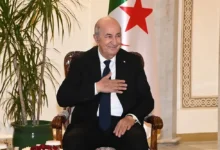Development hinges on deeply rooted African identity – Noureddine Djoudi

The President of the Association of the Friends of the Algerian Revolution, Mr Noureddine Djoudi, has underscored the importance of embracing African identity as a foundation for sustainable development across the continent.
Speaking at a lecture marking the 70th anniversary of the Glorious Algerian Revolution in Accra on Wednesday, he said embracing African identity was not a return to the past but a strategic use of heritage to build a resilient and sustainable future.
The lecture and debate was held in collaboration with the Embassy of Algeria in Ghana and the Institute of African Studies of the University of Ghana.
It was on the theme “The role of Algeria in the independence struggle of Africa,” and it was attended by diplomats, academics, and historians to reflect on Algeria’s pivotal role in Africa’s liberation movements.
The commemoration served not only as a celebration of the Glorious Algerian Revolution but also as a reminder of the enduring relevance of its principles in building a prosperous future for Africa.
The Algerian Revolution (1954–1962), which secured the nation’s independence from French colonial rule, was hailed as a symbol of hope and an inspiration for other African countries fighting for freedom.
In his keynote address, Mr Djoudi highlighted Algeria’s revolutionary legacy and its unwavering commitment to supporting liberation movements across the continent.
Touching on the historical solidarity between Ghana and Algeria, he recounted the bold actions of Ghana’s first president, Dr Kwame Nkrumah, who uniquely elevated Algeria’s National Liberation Front (FLN) representative to the rank of ambassador, even before Algeria had officially attained independence.
He said, “Kwame Nkrumah refused to have a representative of the FLN. He decided that our representative, Frantz Fanon, would be a full-fledged ambassador.”
Algeria also helped Ghana during the 1973 oil embargo, Ghana faced a fuel crisis due to its refinery in Tema running out of petrol.
Algeria intervened, with its president at the time, Houari Boumédiène, ordering the immediate shipment of 2,000 tonnes of petrol to support Ghana, exemplifying the strong bonds between the two nations.
Following its independence, Algeria emerged as a stronghold for liberation movements, offering sanctuary, training, and resources to African freedom fighters.
Mr Djoudi highlighted Algeria’s broader contributions to Africa’s liberation struggles, including its role as a sanctuary for freedom fighters.
The lecture also highlighted Algeria’s leadership in securing the expulsion of apartheid South Africa from the United Nations.
Reflecting on the broader message of African unity, Mr Djoudi emphasised the importance of “carrying Africa at heart” in the fight for development and independence.
He drew examples from Nigeria’s active involvement in liberation struggles in Mozambique, Angola, South Africa, and Zimbabwe, noting that the country’s leaders understood that true independence for one nation could not exist while others remained under colonial rule or apartheid.
The Director, Institute of African Studies, Professor Samuel A. Ntewusu, who also underscored the importance of this history, urged Africans to preserve the revolutionary ideals of unity, resilience, and collaboration in addressing contemporary challenges.
“Africa must draw inspiration from Algeria’s revolutionary history to address modern challenges like economic neo-colonialism and political instability,” he stated.
The Algerian Ambassador to Ghana, Mr Mourad Louhaidia, encouraged young Africans to honour the sacrifices of the continent’s liberation leaders and commit to fostering a united and self-reliant Africa.







